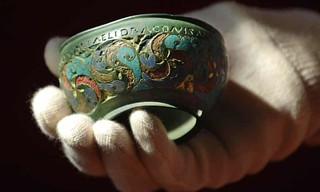
PREV ARTICLE
NEXT ARTICLE
FULL ISSUE
PREV FULL ISSUE
BRITAIN TO UPDATE 1996 TREASURE ACTIn Britain, the government is considering expanding the definition of Treasure to include valuable items not made of precious metals. This may not have much of an effect on coin hoards, as finds of 10 or more bronze coins over 300 years old are already considered Treasure. -Editor
Under the 1996 Treasure Act, objects are designated as treasure trove if found to be more than 300 years old and made of gold or silver, or found with artefacts made of precious metals. Once officially identified as treasure, such objects become the property of the crown and are made available for acquisition by local or national museums for public display. But this medieval view of treasure does not cover many of the important discoveries of the 21st century. Metal detecting has produced an increasing number of objects from Roman Britain that do not meet the criteria since they are often made from bronze rather than precious metals. Additionally, some items of national importance have been lost to the public or have been at risk of being sold to private collectors, the culture department said. The plans for a fresh definition of treasure will aim to ensure that significant finds can be designated as such if they are historically or culturally important, no matter their material qualities. Finders, landowners, museums and members of the public were invited to take part in the consultation process that led to the government's proposals. Detectorists, archaeologists, museums, academies and curators will have the opportunity to contribute to inform the new definition. Plans to streamline the treasure process will also be introduced. The popularity of metal detecting as a hobby has led to an increase in treasure cases from just 79 in 1997 to 1,267 in 2017. In 2017 96% of finds that were declared treasure were discovered through metal detecting. The proposals were welcomed by the British Museum. "We very much welcome working with the [culture department] as it takes forward its work to reform treasure law to protect our shared heritage and encourage best practice amongst finders," said its head of portable antiquities and treasure, Michael Lewis.
To read the complete article, see:
To read a Daily Mail article, see:
To read the complete 1996 Treasure Act, see:

Wayne Homren, Editor The Numismatic Bibliomania Society is a non-profit organization promoting numismatic literature. See our web site at coinbooks.org. To submit items for publication in The E-Sylum, write to the Editor at this address: whomren@gmail.com To subscribe go to: https://my.binhost.com/lists/listinfo/esylum All Rights Reserved. NBS Home Page Contact the NBS webmaster 
|
